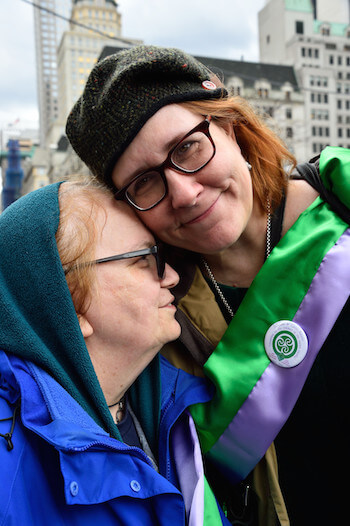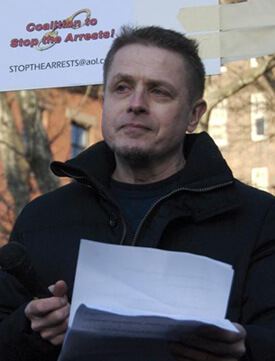Robert Pinter with his attorneys Jeffrey A. Rothman and James I. Meyerson outside the US District Court on Peal Street in Manhattan. | COURTESY: ROBERT PINTER
US District Judge Shira Scheindlin has ruled that Robert Pinter, a gay man who claims to have been wrongly arrested in October 2008 and wrongly prosecuted in a scheme by New York City officials to go after adult businesses by accumulating lots of prostitution arrests, is entitled to his day in court against the city.
Pinter’s arrest and those of other gay men on prostitution charges in adult video stores in 2008 and early 2009 –– reported in detail at the time in Gay City News –– are widely viewed as illegitimate by the LGBT community and many elected officials. Pinter’s conviction, after he was advised to plead guilty to lesser charges, was later vacated and his case dismissed, and the Manhattan district attorney also dropped prosecutions of some other gay defendants.
Scheindlin denied the city’s motion for summary judgment on most of Pinter’s federal claims and scheduled a conference with the parties for October 31 to plan for the rest of the case.
Even though an appeals court took individual officials off the hook, false prostitution arrest could cost New York City
Pinter’s case already went to the Second Circuit US Court of Appeals, which ruled that the individual defendants –– police officers, prosecutors, and city officials –– were entitled to what is known as “qualified immunity” from liability based on that court’s conclusion that Pinter’s factual allegations, even if accepted, support a finding that the arresting officers had “arguable probable cause” to make their arrest.
The Second Circuit also said that Pinter’s claims against the city “are derivative of his claims against the individual defendants, and therefore any claims dismissed as against the individual defendants must also be dismissed as against the city.” Relying on this, the city moved to dismiss all of his remaining claims.
But Judge Scheindlin found that the Second Circuit in August issued another decision on municipal liability that contradicts its statement in the Pinter case, and she decided it would be appropriate to follow the newer decision rather than the earlier Pinter decision, as a more recent and authoritative circuit statement on municipal liability in cases where its employees themselves enjoy qualified immunity. She based her decision, in part, on a distinction between “arguable probable cause” and actual probable cause, concluding that if a jury believed Pinter’s account of what happened, it could conclude that there was not actual probable cause for his arrest.
According to Pinter, a gay man who was then 52, he was browsing in the pornography section of an adult establishment, the Blue Door in the East Village, when a young undercover police officer made eye contact and initiated conversation about what Pinter “liked to do.” Oral sex came up. Though there was a part of the store where gay men engaged in sexual activity, the undercover said he was nervous about doing anything in the store and said his car was nearby.
Pinter started to walk to the exit, followed by the undercover, who, “at the door but before leaving the store,” said, according to Pinter, “I want to pay you $50 to suck your dick.” Pinter said he was caught off guard by this and quickly decided that there was no possibility he would go through with having sex with this man. Instead, he starting walking toward his apartment, which was in the same direction as the undercover’s car and kept up “playful banter” with the officer. At no time did he indicate he would accept money for sex, he said, and the undercover made no further mention of that.
Suddenly, other police officers appeared, pushed Pinter against a fence, and arrested him. He was tightly handcuffed and placed in a police van, which drove around for several hours until depositing him at a police station. Although he complained about the tightness of the cuffs, the officers refused to loosen them, even though no other arrestees were in the van and Pinter was unarmed. Pinter subsequently required medical treatment for injuries sustained from this experience.
He initially pleaded guilty to a reduced charge of disorderly conduct, but when he found out that other men were being arrested under similar circumstances he filed a motion to vacate his conviction, which was not opposed by the Manhattan District Attorney’s Office. An assistant DA submitted a statement to the court, stating it was unlikely Pinter went to the Blue Door intending to solicit money for sex and that the prosecutor’s office had already dismissed three similar pending cases after concluding “it would be difficult to prove the guilt of defendants in those cases beyond a reasonable doubt at trial.”
Pinter’s federal lawsuit charged the officers, prosecutors, and city officials –– including Police Commissioner Raymond Kelly and Mayor Michael Bloomberg –– with violations of his constitutional rights, contending he was subjected to false arrest, malicious prosecution, malicious abuse of process, sexual orientation discrimination, violation of freedom of association, unreasonable detention, and excessive force. The individual defendants sought to dismiss the claims against them based on a qualified immunity theory, which Scheindlin rejected but the Second Circuit accepted on appeal, with the Supreme Court refusing Pinter’s petition to review that ruling.
In this new opinion, Scheindlin dealt with the city’s argument that all remaining claims should be dismissed. She found that the city could still be held liable for many — but not all — of Pinter’s claims. His allegations were not sufficient to support a sexual orientation discrimination claim, Scheindlin concluded, because he did not provide any evidence there was selective prosecution of prostitution cases based on the sexual orientation of those arrested. She noted that police records showed heterosexual women were also being arrested for soliciting at adult businesses. Scheindlin also found that federal precedents do not recognize a constitutional freedom of association claim based on interference with somebody’s ability to shop at a particular commercial establishment.
But the judge found that a reasonable jury could conclude, based on Pinter’s allegations, that there was no actual probable cause for his arrest, making it wrongful; that under the circumstances the district attorney’s decision to prosecute him could also be wrongful; and, that if he proved the scheme he was alleging about using spurious prostitution arrests to support nuisance claims against adult businesses, he would have shown abuse of process in misusing an arrest for ulterior purposes.
Scheindlin also found that Pinter’s allegations were sufficient to support claims for excessive force and detention arising from his treatment in the police van, noting that some of the deposition evidence from city officials themselves demonstrate that the city failed to train police officers about their obligations concerning treatment of arrestees.
The city, therefore, may still be subject to significant liability in Pinter’s case, and it would not be surprising if a new mayor sees this as one of the pending lawsuits that should be settled without a trial. Pinter is represented by attorneys James I. Meyerson and Jeffrey A. Rothman. Any settlement that includes the city’s commitment to desist from these sorts of spurious arrests and to train police officers about appropriate treatment of arrestees would be a welcome turn of events.



































